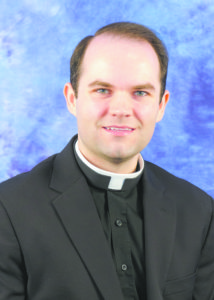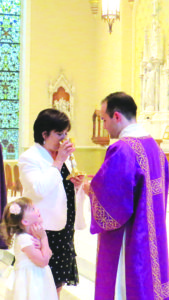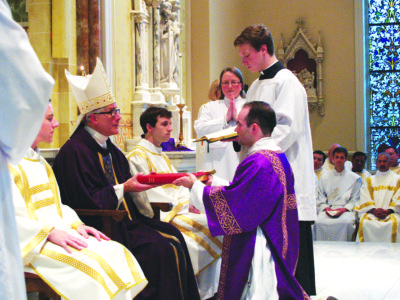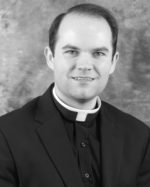Seminarian REFLECTION
By Deacon Aaron Williams

Aaron Williams
When I was a student at St. Joseph School in Madison, each year I volunteered to serve the Baccalaureate Mass which Bishop Joseph Latino would celebrate for the graduating class. After a few years, I noticed that his homily each year had a common theme: thankfulness for Catholic education, for parents and for God’s many blessings.
Of course, all of us have much for which we may be thankful, but principally among these blessings is that of the extreme love of God – a love which is in a small way mirrored by the love of parents who make many sacrifices so that their children may have a good education, or even so that they may have what they need to live healthy and holy lives. Yet, the gift of God’s love, which was made Incarnate in the sacrifice of Christ on the cross, is so generous that humankind, unaided, is incapable of rendering to him the true thanksgiving he deserves.
The paradox is that, in Christ, we are capable of giving proper thanks to God because he has blessed us with the proper means –”our thanksgiving is itself [his] gift,” as is said in one of the prefaces used at Mass. In the Old Testament, God commanded the chosen people to offer daily the Todah offering (cf. Leviticus 7:12). This was not a bloody offering like the sacrifices offered to atone for sins, but was an offering of unleavened cakes and oil.
The Hebrew word todah translates as ‘thanksgiving’ and thus this offering, unlike the sin offerings of flesh, was a purely sumptuous expression of man’s thankfulness to God.
It is interesting, therefore, that the apostles, when considering how they were going to refer to the daily offering of the Lord’s supper, chose to call it the Greek word eucharistia, which literally translates as ‘thanksgiving.’ The apostles recognized that the offering of bread and wine in the New Covenant was a continuation of the todah of the Old Covenant. But, unlike the Old Covenant, which required separate offerings for thanksgiving and for sin, this new sacrifice was not merely bread but also flesh.
It was not merely an offering in thanksgiving but an offering that atones for sins as well. In essence, Christ took the entire gambit of sacrifice from the Hebrew Temple system and refined it into his one sacrifice: i.e the Eucharist is at once the todah, the sin offerings and the Passover (Paschal) sacrifice.
This could not be the case unless this bread and this wine which are offered daily in the Mass were not more than mere food, but truly flesh as well. St. Thomas Aquinas summarizes this beautifully in the sequence he wrote for the feast of Corpus Christi – the Lauda Sion. He says: On this altar of the King this new Paschal Offering brings and end to ancient rite…Here beneath these signs are hidden priceless things, to sense forbidden; signs, not things are all we see. Flesh from bread and Blood from wine, yet is Christ in either sign, all entire confessed to be. And whoever of Him partakes, severs not, nor rends, nor breaks: all entire, their Lord receive.
As many young people are celebrating their own high school and college graduations, they would do well to take the advice of Bishop emeritus Latino and be thankful for the gift of their education, but I would add that they may best express their thankfulness through their continual participation in the supreme act of thanksgiving we have in the Mass – which means that as they leave their parents’ homes, they need to ask themselves where they will go to Mass this coming fall. How will they continue to offer Eucharistia to God for all his many gifts and blessings?
(Deacon Aaron M. Williams is preparing to begin his eighth year of seminary formation. For the next few months, he will be serving in a diaconate internship at Meridian Saints Patrick and Joseph parishes. During the summer, Aaron also participates in a program at the Liturgical Institute of the University of Saint Mary of the Lake near Chicago where he is pursuing a masters degree in liturgy. He and his classmate, Deacon Nick Adam, will be ordained priests for our diocese on May 31, 2018)

 Julia Williams said she encouraged her son to explore his vocation early, but both parents said they would have supported any decision he made. “I always felt like he had it (a vocation) and I was never going to discourage him. A lot of people kept saying ‘he’s young and he’ll change his mind,’ but I said I am not going to discourage him. If that’s what he wants, I am here to support him, especially when he got into junior high and people were like ‘is he going to grow out of it now?’ I said, if he’s wants it – then I am with him,” said Julia.
Julia Williams said she encouraged her son to explore his vocation early, but both parents said they would have supported any decision he made. “I always felt like he had it (a vocation) and I was never going to discourage him. A lot of people kept saying ‘he’s young and he’ll change his mind,’ but I said I am not going to discourage him. If that’s what he wants, I am here to support him, especially when he got into junior high and people were like ‘is he going to grow out of it now?’ I said, if he’s wants it – then I am with him,” said Julia.
 The twentieth century liturgical theologian, Romano Guardini, devoted the fifth chapter of his famous “Spirit of the Liturgy” to discuss the seeming lack of purpose in the liturgy. He raises a series of important questions which are at the heart of why so many people find the “extravagance” of the liturgy a form of useless pageantry. Why is it necessary, for example, that a Church be richly decorated or that a priest wear vestments?
The twentieth century liturgical theologian, Romano Guardini, devoted the fifth chapter of his famous “Spirit of the Liturgy” to discuss the seeming lack of purpose in the liturgy. He raises a series of important questions which are at the heart of why so many people find the “extravagance” of the liturgy a form of useless pageantry. Why is it necessary, for example, that a Church be richly decorated or that a priest wear vestments?